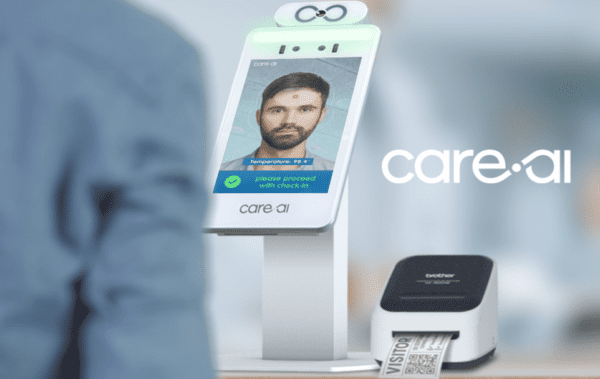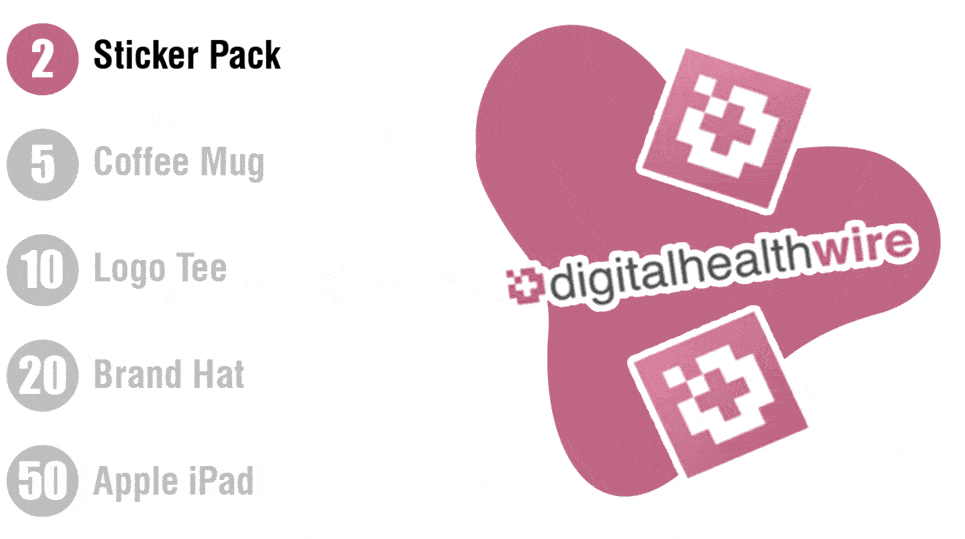|
care.ai Ambient Monitoring | Amwell + Talkspace
December 1, 2022
|
|
|

|
|
Together with
|

|
|
|
“All these different venues of care – hospital, home, virtual – are different venues of the same care, so it does not make sense to have different tech platforms for the same care that you’re getting.”
|
|
care.ai CEO Chakri Toleti
|
|

|
|
“Non-clinical workflow” companies continue to lead the pack in terms of digital health funding, and ambient monitoring startup care.ai just added $27M to the segment’s Q4 total following its latest raise.
care.ai’s Smart Care Facility Platform uses ambient sensors spread within care facilities to monitor patients and their caregivers, informing real-time clinical and operational insights.
- The platform records data such as patient bed exits and falls, while also reducing manual tracking in EHRs by enabling contactless check-ins and screenings.
- The ambient nature of the solution means that patients aren’t required to wear any RPM device for it to be effective, removing a big source of friction for many virtual nursing or virtual sitting programs.
The fresh funding will help care.ai expand to more hospitals, skilled nursing facilities, and assisted living facilities, building on the 1,500 locations already using its technology.
- care.ai points to the continued prevalence of staff shortages and burnout as key demand drivers for its solutions, which aims to improve the lives of overworked staff by automating away manual workflows.
- Other products from GE, ADT Health, or even Amazon’s Alexa fall detection feature compete at least somewhat within the same arena, but care.ai is focused on creating the first truly care site-agnostic solution to the problem of ambient patient monitoring.
The Takeaway
care.ai is setting out to automate away the manual processes causing higher burnout and operational costs for the organizations attempting to deliver optimal care. It’s a tough promise to live up to, but the company’s leadership has done it before. care.ai founder and CEO Chakri Toleti sold his previous patient engagement startup HealthGrid to Allscripts for $60M, and prior to that was putting his motion sensor expertise to work while filming what look to be some pretty epic Bollywood action movies.
|




|
|
4 Tips for Licensing Your Telehealth Providers
Telemedicine is the next frontier of care delivery, yet many providers continue to be hampered by the complex process of medical licensing. If you’re one of them, check out Medallion’s four tips for licensing your telehealth providers.
|
|
What’s Patient Engagement to a PAC Manager?
Nuance’s patient engagement guide for hospital execs shares the challenges faced by Patient Access Center Managers and explores how equipping them with the right solutions can help give every patient simple access to care.
|
|
- Amwell Rumored to be Acquiring Talkspace: Amwell is reportedly in “late stage” discussions to acquire Talkspace for $1.50 per share or ~$200M total (a 67% premium for anyone interested in playing the rumor), quite the turn of events considering that Talkspace allegedly rejected a different acquisition attempt from Amwell in June of this year. The two companies coming to the table again is likely a sign that Talkspace’s D2C therapy business is on shaky ground as consumers start tightening their purse strings, and that Amwell thinks it can unlock some hidden potential with Talkspace’s D2C side as well as its employer/payor contracts that are currently available to 86M eligible lives.
- Epic EHR for Apple Users: Axios recently got the scoop on a major partnership between two of the biggest names in the business: Epic and Apple are developing a macOS-friendly version of Epic’s EHR. A “source inside Epic” told reporters that Apple had tried pushing Epic to create a “native version of the service” for Apple devices, but the two companies ended up compromising on a version that’s “easier to run on Apple devices.”
- Behavioral Health PE Momentum: Private equity investors continued flocking to behavioral health startups during Q3, according to a new report from The Braff Group. Through the first three quarters of the year, Braff Group counted a total of 151 behavioral health PE transactions, up 5% compared to 2021 but still trailing last year’s record-setting 256 transactions. The most capital appears to be flowing into substance use disorder startups (up 9% since 2020), mental health companies (up 14%), and non-autism developmental disorders (up 33%).
- Record Breaking Drug Cost: The FDA approved the first gene therapy for Hemophilia B, called Hemgenix, which is the first one-time treatment for the genetic blood-clotting disorder that usually requires ongoing infusions. Pennsylvania-based drugmaker CSL Behring raised some eyebrows when it revealed the cost of the drug, $3.5M per dose, but said it would ultimately reduce healthcare costs because patients would have fewer bleeding incidents and require fewer clotting treatments.
- To Gamify, or Not to Gamify: Although not exactly a healthcare-specific theme, this UX Collective article does a good job breaking down why gamification might not be the best route for product teams in any field. When business executives suggest gamification, they’re usually bundling a bunch of expectations like generating higher user interaction, increasing user retention, and making the product fun. UX Collective recommends addressing these goals individually, rather than choosing a more “exciting” approach that’s harder to implement and might not even achieve the actual business objective.
- Global PCP Burnout: A Commonwealth Fund report found that primary care physicians across 10 high-income countries are reporting higher workloads caused by backlogs of patients, sicker populations, and more time spent on administrative tasks. Across all countries, the survey of 9.5k PCPs revealed that physicians under the age of 55 are more likely to be burned out than older doctors, although 50% of PCPs in the US over age 55 said they would probably stop seeing patients in the next three years.
- Elation & Ribbon Integration: Elation Health announced a partnership to integrate Ribbon Health’s provider directory data into a new referral management program designed to improve transparency into referred doctors, health plans, and costs of care. Integrating Ribbon’s data into Elation’s EHR will allow the 24k clinicians who use the EHR to easily refer patients to providers who are in-network and fit their needs.
- Novi Health Series A: Singapore-based Novi Health raised $5M in Series A funding to support the development of its platform that integrates clinical treatments with behavioral and lifestyle interventions for holistic chronic condition management. Novi currently focuses on two main service lines, with Novi Magnum combining continuous glucose monitoring with lifestyle coaching to help patients with diabetes, and Novi Optimum Plus pairing medical treatment with health coaching to help people with sustainable weight loss.
- Travel Nurse Demand: Even with the slowdown in COVID-19 patient volumes, travel nurse demand remains elevated due to hospitals struggling to fill vacancies from staff departures. A report from Vivian Health shows that the average weekly salary for travel nurses in October was $3.1k, which is still considerably higher than the pre-pandemic average of $1.9k. The full report has the complete breakdown for those curious about individual regions or nurse qualifications.
- JP Morgan Healthcare Strategy: Forbes published an interesting article on JP Morgan’s healthcare investment strategy following the hiring of Dr. Cheryl Pegus to help lead Morgan Health. Dr. Pegus previously served as Walmart’s EVP of Health & Wellness, where she helped expand the retailer’s telehealth services and community center footprint. She’ll now focus on deploying $250M of Morgan Health capital to help scale companies focused on driving greater accountability in healthcare (previous investments include Vera Whole Health, Embold Health, Centivo, and LetsGetChecked).
- HHS Substance Use Rule: The HHS proposed a new rule that would increase privacy protections around medical records of patients with substance use disorders to avoid discrimination in treatment. The proposed rule would implement provisions of the CARES Act that require confidentiality for SUD treatment records that better align with HIPAA protections, which the American Hospital Association supported as a way to help eliminate the stigma around seeking help for substance use.
|
|
Prescription Assistance Made Easy
Synapse Medicine’s quick-deploy Prescription Assistance API and components can be up and running in less than a day and instantly connect your HCPs to the drug data and prescribing support they need in their everyday practice. Join Synapse CEO Clement Goehrs and Lead Strategist Martin Cech in their upcoming webinar on Tuesday, December 6 to discover how easy it can be to onboard reliable real-time drug data for your providers.
|
|
Human Factors in Medical Device Design
How patients interact with a medical device can have as much impact as the device itself. Check out this Q&A with Hyperfine Lead Product Designer Corinne Hay to learn how human factors influence the design of everything from prescription containers to portable MRI systems.
|
|
Innovation Starts With Listening to Nurses
Nurses are the most valuable players in the healthcare system. Their wisdom and dedication serves as a constant reminder for what’s possible in healthcare when we listen. Check out the connectRN virtual experience to hear 10 powerful stories from nurses who want to disrupt the industry.
|
|
|
Share Digital Health Wire
|
|
Spread the news & help us grow ⚡
|
|
Refer colleagues with your unique link and earn rewards.
|

|
|
|
|
Or copy and share your custom referral link: *|SHAREURL|*
|
|
You currently have *|REFERRALS|* referrals.
|
|
|
|
|